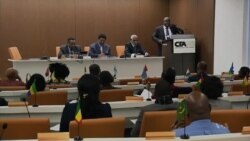West African leaders hope to contain the spread the Ebola virus by December of this year, but say it can only be done with robust international help. Countries most hit by the deadly virus, Liberia, Sierra Leone and Guinea, are appealing to their diaspora abroad to join the effort. A U.S.- African forum in Washington discussed the immediate needs of these countries and what African groups in the United States can do to help.
Delegates from the meeting at the African Union Mission in Washington Friday stressed that Ebola is a global problem and that every nation has a role in helping bring it to an end.
Sierra Leone Ambassador to the United States Bockari Stevens said Western countries have pledged to send medical experts and material support to fight the disease in West Africa, but it has taken some time to arrive.
"And the British promised to build a 700-bed hospital - that has not been done yet, but they have started construction," said Stevens. "The Cubans went yesterday - 165 Cubans landed - doctors - Cuban doctors landed in Sierra Leone. With all of these effort now being marshaled together, we should be able to see some light at the end of the tunnel."
Ambassador Stevens said efforts in his country have not stopped Ebola's destructive path. He said 18 more people died from the virus on the streets of Freetown on Thursday. But he said the Sierra Leonean diaspora has been helpful.
"In fact, we have diaspora, as well, volunteering, especially diasporas in the medical field: nurses, paramedics, doctors," he said. "Some of them are in Freetown Sierra Leone now, helping with the training and motivating of our local health workers."
The ambassador called Ebola the world biggest terrorist, but said with enough international support it could be defeated.
A delegate from Zimbabwe, Emmanual Nnadozie, urged a vigorous response by the international community to Ebola and other problems in West Africa.
"Because after Ebola there will be a need to deal with the consequences of Ebola, there will be need also to build strong institutions to prevent such a crisis from happening again," he said.
Representatives of the most affected West African countries stressed the importance of solidarity in the fight against Ebola.
Chinua Akukwe, chairman of the National Academy of Public Administration in Washington, said the spread of Ebola outside Africa shows that the world cannot ignore the problem.
"In the [U.S.] Congress I have called for a new public-private partnership to deal with Ebola with the immediate and long-term goal of rebuilding health systems in Africa," said Akukwe.
Participants at the forum said that containing Ebola is only the first step in helping Liberia, Sierra Leone and Guinea recover from the disease. The three countries will also need help to put education, agriculture, business and industrial sector back on track after suffering losses in the current outbreak. Their ability to prevent another health disaster in the future may depend on how well they rebuild after this one.





